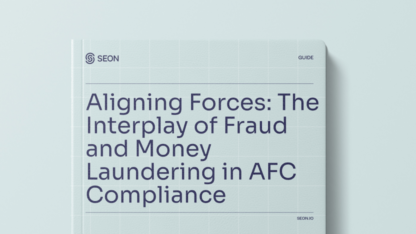There are well over four billion email addresses in use globally. Reverse email lookup is an invaluable tool for anyone who wishes to learn more about an individual based only on the person’s email address.
For an example of reverse email search in action, try out SEON’s email lookup widget:
Enter an email to start your lookup:
If looking up a phone number, please include its country code without plus signs, spaces or hyphens. By trying this tool, you’re agreeing to our Privacy Policy, General Terms of Service and Data Processing Agreement.
Below, we look at what reverse email lookup is, how it works, and the many ways that it can benefit users.
What Is a Reverse Email Lookup?
Reverse email lookup is a process or service that allows you to find information about a person or entity using their email address as the starting point. As an investigative tool, reverse email lookup scans numerous sources, such as social networks, public records and databases, to gather comprehensive data linked to an email ID.
Typically, when you input an email address into a reverse email lookup service, the system searches through available data points to provide relevant personal and professional details. Often, this includes contact information, social media activity, professional history, and sometimes even sensitive data like legal records or security threats associated with an email address.
Reverse email lookup enables digital footprint analysis, where you attain additional information based on a limited number of data points. When combined with other digital signals, such as a reverse phone lookup or Bank Identification Number (BIN) lookup, this approach can create a more complete profile of an individual, enhancing your understanding of their online behavior and potential risk factors.

How Do I Perform a Reverse Email Lookup?
Most of the time, you can simply enter the email address into the search bar of the reverse email lookup system and press the Enter button. If the email address has been correctly identified and found to be connected to publicly available information online, the results will appear directly on the website. Some providers also deliver PDF reports.
For more advanced lookups, you can use application programming interface (API) calls or web browser extensions dedicated to reverse lookup services. For some reverse lookup systems, you can also improve the overall efficiency and usability of the process by uploading email addresses in bulk with a spreadsheet input and downloading results to a dedicated document for your own records.
What Information Can You Find with a Reverse Email Lookup?
A reverse email lookup can reveal various information associated with an email address. The exact information available depends on factors such as the privacy settings of the email owner, the databases accessed by the lookup service and the legality of accessing certain types of information. Here’s an overview of what you might find:
- Personal Information – Such as full name, age or date of birth, gender, current and previous addresses and family members or relatives
- Contact Details – Phone numbers (both mobile and landlines are applicable), alternate email addresses and instant messaging handles
- Professional Information – Including current and past employment, job titles, company affiliations and professional licenses or certifications
- Online Presence – Social media profiles (e.g., Facebook, LinkedIn, Twitter, Instagram), personal websites or blogs, forum memberships, online aliases and other usernames
- Public Records – Property ownership records, court records (civil or criminal), marriage and divorce records, bankruptcy filings
- Educational Background – Schools attended, degrees earned, year of graduation
- Additional Details – Registered domain names, associated IP addresses, email service provider information and account creation date
Can You Track Anonymous Emails with Reverse Email Lookups?
Yes, reverse email lookups can help identify anonymous email users, although the depth of information retrieved varies based on privacy settings and the database’s scope. Anonymous emails – often created to mask the identity of their users – still tend to leave traces across the internet, especially if they’re linked to social accounts, online forums or other services requiring verification. This means that even an anonymous email can sometimes yield connections to aliases, profile pictures or general locations.
Anonymized services like temporary emails yield fewer insights, as they’re designed to limit traceable data. The success of identifying anonymous emails depends on the lookup service, with those aggregating OSINT or using social profiling offering better insights. Specialized tools with email analysis algorithms can also detect patterns indicating temporary or potentially risky use.
How Does a Reverse Email Lookup Work?
A reverse email lookup works by receiving an email address from its user and then searching publicly available records, such as online directories and social media accounts, for any and all instances where that email address appears.
The resultant data is then presented to the user so they can – if this process is successful – obtain a profile of the email address owner. Shown as a step-by-step list, the process can be summarized as follows:
- Receive user input: The lookup tool receives the email address from the user.
- Search databases: The tool scans publicly available records.
- Match records: It identifies any matches between the email address and the publicly available information.
- Display results: The tool displays the matched records to the user.
This process is facilitated by sophisticated algorithms that scan and analyze vast amounts of data quickly and efficiently. Integrating multiple data sources enhances the accuracy and completeness of the results, making reverse email lookup a powerful tool for digital verification and personal or professional investigation. By utilizing this technology, users can uncover a comprehensive digital footprint of an email address owner, providing valuable insights into their identity and activities.
How Can a Reverse Email Lookup Help You?
A reverse email lookup helps you determine the details of the email address owner. Being able to access this information can increase your organization’s cybersafety, help you gauge and report suspicious contacts, and make your business’s email-based and social media marketing efforts more efficient.
Respectively, these three benefits are possible because reverse email lookup achieves the following things:
- It puts a quick and easy identity verification search bar at your fingertips so you can rest assured that an extra layer of security applies whenever your organization encounters a new email sender/account holder.
- It lets you gauge whether someone is using a real email account and whether it belongs to the person they say they are, meaning that you’re better equipped to evaluate a contact’s risk level and whether that person should be reported to a cybersecurity authority.
- It helps you know who best to contact when your organization wishes to network with potential business leads or customers online.
Putting this all together, reverse email lookup helps you be safer, better protected, and more seamlessly connected online.
See how SEON’s reverse email lookup helps you spot fake users, assess risk, and speed up verification—guided by our fraud experts.
Speak with an expert
What Are Important Trends in Reverse Email Lookup?
Data enrichment, data aggregation, and social media intelligence (SOCMINT) are three key trends that bReverse email lookup tools are evolving with significant trends, largely driven by the rise in email-based fraud, AI advancements and regulatory pressures. One key trend is the use of machine learning algorithms to enhance lookup accuracy and fraud detection capabilities. By leveraging AI, lookup services are now able to detect subtle indicators of fake or temporarily created emails, assess behavior patterns and flag inconsistencies that may suggest synthetic identities.
An emerging trend is the use of privacy-compliant data sources that align with GDPR and CCPA, ensuring lawful data use and strengthening trust. Additionally, the rise in global digital interactions drives demand for API-based lookup services, enabling instant email risk analysis within existing fraud prevention tools.
How Can SEON Help with Reverse Email Lookup?
SEON’s reverse email lookup capabilities offer a strong layer of fraud detection, making it easier for businesses to identify high-risk behaviors linked to email addresses. SEON integrates OSINT and digital footprint analysis to evaluate emails against multiple data sources, including social profiles and device connections, providing a detailed risk profile especially beneficial for high-stakes industries like fintech, iGaming and e-commerce, where rapid verification is crucial for detecting account takeovers and synthetic identities.
With SEON’s API-first approach, businesses can perform lookups directly within their workflows, accelerating customer onboarding without compromising security. SEON’s email module is uniquely designed to detect synthetic and fraudulent emails, allowing for more accurate customer segmentation and fraud scoring. Whether it’s to confirm legitimate users or identify threats, SEON’s solutions enable businesses to stay resilient in a high-risk digital environment, supported by continuously updated data on evolving fraud tactics.
Sun Finance cuts fake applications and boosts credit scoring with SEON’s email analysis. See how they verify users and stop fraud fast.
Read case study
Sources
Frequently Asked Questions
While the act of legitimately carrying out a reverse email lookup is legal, whether the search itself will involve sifting through GDPR-compliant data depends on whether the target email address is connected to GDPR-compliant public records. Plus, some email lookup tools follow different jurisdictions and terms and conditions, so your best course would be to check the terms of use for each lookup tool you use.
Use search tools that are designed to reveal the email address owner’s IP address, such as SEON’s email lookup. Also, scrutinize the email address’s domain type because this could reflect where the person lives and where they work. Plus, by entering the email address in a search engine, you may find that it’s already attached to online databases, such as those hosted by LinkedIn and Meta.
It is certainly free to do a single reverse email lookup given that you can easily find free ones online. That said, the more you look for software that offers a high quantity – and quality – of reverse email lookup checks, the more likely it is that you’ll start being charged for the convenience.
Most email lookup tools enrich data from open-source databases, such as those related to social media accounts and phone number directories. SEON’s lookup, for example, aggregates device, IP, and social media information.
It can provide information about the nature of the email and the location that it came from, and possibly the level of legitimacy or suspicion that applies to it. For example, “@wh!tehouse.g0v” is far more likely to have been sent from a high-risk sender than one sent from “@whitehouse.gov”.










